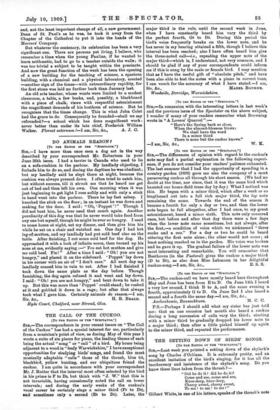THE CALL OF THE CUCKOO.
[TO TDB EDITOR 01 TIM SPECTATOR:1
SIR,—The correspondence in your recent issues on "The Call of the Cuckoo" has had a special interest for me, particularly from a musician's point of view, as during May of this year I wrote a suite of six pieces for piano, the leading theme of each being the actual " song " or "call" of a bird. My home being adjacent to a wood in "leafy Warwickshire," I have exceptional opportunities for studying birds' songs, and found the most musically adaptable " calls " those of the thrush, blue tit, blackbird, yellow bunting, and our ubiquitous friend the cuckoo. I am quite in accordance with your correspondent Mr. J. Rutter that the interval most often selected by the bird in his prime is F to Di2, but think with "J. W." that this is not invariable, having occasionally noted the call on lower intervals; and during the early weeks of the cuckoo's vocal career he certainly sings a minor third (Fiz to Db), and sometimes only a second (M to Db). Later, the
major third is the rule, until the second week in June, when I have constantly heard him vary the third by the perfect fourth, Glz to Db.. During this period the bird's voice frequently breaks on the lower note, and he has never in my bearing attained a fifth, though I believe this interval has been reached ; also I have often heard him give the three-noted call—i.e., repeating the upper note of the major third—which is, I understand, not very common, and I should be glad if any of your correspondents could inform me if this is sung by the male or female bird. I may mention that as I have the useful gift of "absolute pitch," and have been also able to test the notes with a piano in correct tune, I can vouch for the accuracy of what I have stated.—I am,










































 Previous page
Previous page